Catherine Lucey, en White House-korrespondent for Bloomberg News, gjorde simpelthen bare sit arbejde ved at stille relevante spørgsmål. For et par dage siden, under en uformel pressebriefing om bord på Air Force One, stillede hun et rimeligt spørgsmål til Donald Trump om udgivelsen af Epstein-filerne - et spørgsmål af betydelig offentlig interesse. Hun spurgte, hvorfor Trump havde været undvigende, hvis der, som han hævdede, ikke var noget kompromitterende i dokumenterne.
Hans svar var imidlertid langt fra rimeligt. Det var nedværdigende, stødende og sexistisk. Han pegede direkte på Lucey og beordrede hende til at stoppe med at gøre sit arbejde og sagde: "Stille. Stille, lille gris," fra USA's præsident.
Ud fra hvad jeg observerede, var der ingen af hendes journalistkolleger, der straks kom hende til undsætning. Øjeblikket passerede, og tingene fortsatte, som om intet usædvanligt var sket.
Alligevel, hvis jeg skulle kortlægge Trumps historie med at bruge pressen som mål, ville denne hændelse skille sig ud. Måske var det hans pegende gestus, eller hans direkte ordre som om han kunne diktere, hvilke spørgsmål journalister må stille. Sandsynligvis var det den ondskabsfulde udskældning, der havde til formål at ydmyge en reporter offentligt, eller den stilhed fra hendes kolleger, der fulgte.
Sådan er livet i Trumps Amerika. Bare i løbet af den sidste dag hyldede Trump den saudiske kronprins - som ifølge en amerikansk efterretningsrapport fra 2021 godkendte mordet på Washington Post-journalisten Jamal Khashoggi - som en helt i Det Hvide Hus. (Kronprinsen har benægtet enhver indblanding.) Trump fornærmede og truede også ABC News og deres reporter Mary Bruce for at stille relevante spørgsmål om Khashoggi og Epstein-filerne, kaldte hende en "frygtelig reporter" og foreslog, at netværkets licens skulle tilbagekaldes for "falske" nyheder.
Vi forventes at være vant til denne adfærd nu. Det er tydeligt, at hans ardent støtter bakker op om den og ser den som en måde for præsidenten at bruge sin magt til at underminere de "eliter", han har lært dem at foragte. Men at blive afstumpet er farligt. Vi bliver trætte, og selv de mest bekymrede blandt os trækker på skuldrene og spørger: "Hvad kan man gøre?"
For mig skærer "stille, lille gris" igennem støjen. Det burde være en grænseoverskridelse for langt, ikke bare rutine. Forestil jer, hvis hele pressens corps havde råbt op for at forsvare deres kollega eller var gået ud i protest. Hvorfor gjorde de ikke det?
Bill Grueskin, en tidligere redaktør på Miami Herald og Wall Street Journal, som nu underviser på Columbia Journalism School, forklarede på Bluesky: "Fordi adgang slår solidaritet, hver eneste dag." Enhver journalist, der vovede at protestere, ville sandsynligvis blive udelukket fra fremtidige briefinger.
Så ja, adgangsdilemmaet er virkeligt. Og desværre tier de også, fordi de er blevet vant til sådan behandling. Dette er ikke nyt; det er bare et særlig groft eksempel på det, der er sket i årevis.
Jeg har iagttaget Trumps taktik i lang tid. Som Washington Posts mediekolumnist gennem hele hans første periode oplevede jeg på første hånd, hvordan han konsekvent nedgjorde pressen - især kvinder, og endnu mere kvinder af anden etnisk herkomst. For eksempel stødte han hyppigt sammen med Yamiche Alcindor, som dengang var White House-korrespondent for PBS NewsHour, og kritiserede hendes "uanstændige" spørgsmål. I år kaldte han Alcindor, som nu er hos NBC, for "andenrangs" og forlangte at... Han sagde også til en anden, at de skulle "være stille." Han kaldte offentligt April Ryan, en længevarende White House-reporter, for "en taber." Intet ændrer sig – det bliver kun værre – fordi Trump ikke står over for nogen konsekvenser. Hans standhaftige støtter synes ikke at bekymre sig om det. Pressens corps måske skriver et skarpt formuleret brev, eller også gør de ikke, men ved deres passivitet normaliserer de også denne adfærd.
Vil dette "stille, lille gris"-øjeblik gøre en forskel? Kun for dem, der værdsætter anstændighed hos offentlige personer og i det amerikanske samfund. Måske er det en gammeldags idé. Og jeg er ikke sikker på, at der er nok af os tilbage, der husker, hvorfor det betyder noget.
Margaret Sullivan er en Guardian US-kolumnist, der dækker medier, politik og kultur.
Ofte stillede spørgsmål
Selvfølgelig. Her er en liste over ofte stillede spørgsmål om Margaret Sullivans kommentar til Donald Trumps "stille, lille gris"-bemærkning, designet med klare, naturlige spørgsmål og direkte svar.
Generelle begynder-spørgsmål
Q1: Hvem er Margaret Sullivan?
A1: Hun er en velkendt og respekteret mediekolumnist og journalist. Hun skriver ofte om pressefrihed, politisk dækning og forholdet mellem medierne og magthaverne.
Q2: Hvad er "stille, lille gris"-hændelsen, som hun skrev om?
A2: I 2024, under sin straffesag om tavshedspenge, blev Donald Trump ifølge rapporter hørt mumle "stille, lille gris" til en reporter i retssalen. Kommentaren blev bredt fordømt som nedværdigende og fornærmende.
Q3: Hvorfor var denne kommentar så chokerende ifølge Sullivan?
A3: Sullivan argumenterede for, at selv for Trump, som har en lang historie med at fornærme folk, var denne kommentar enestående chokerende, fordi det var et personligt, misogynt og umenneskeliggørende angreb, leveret direkte og stille til en journalist, der blot prøvede at gøre sit arbejde.
Q4: Hvad var hovedpointen i Margaret Sullivans klumme om dette?
A4: Hendes hovedpointe var, at denne hændelse var et skarpt eksempel på Trumps dybt forankrede foragt for en fri presse og hans brug af mobbetaktikker for at intimidere og tavshedsætte kritikere.
Dybdegående & avancerede spørgsmål
Q5: Hvordan passer denne "stille, lille gris"-bemærkning ind i den større kontekst af Trumps forhold til medierne?
A5: Den er en del af et længerevarende mønster. Trump har hyppigt mærket medierne som "folkets fjende", kaldt reportere for "fake news" og brugt personlige fornærmelser. Denne bemærkning var en mere visceral én-til-én version af den samme fjendtlighed.
Q6: Hvad foreslår Sullivan, er faren ved at normalisere denne slags retorik?
A6: Hun antyder, at når sådan adfærd normaliseres, underminerer den offentlighedens tillid til journalistik, opfordrer til yderligere chikane af journalister og svækker pressens essentielle rolle i at holde magtfulde mennesker til ansvar i et demokrati.
Q7: Hvad er journalistens ansvar i lyset af sådanne personlige angreb, som diskuteret af Sullivan?



